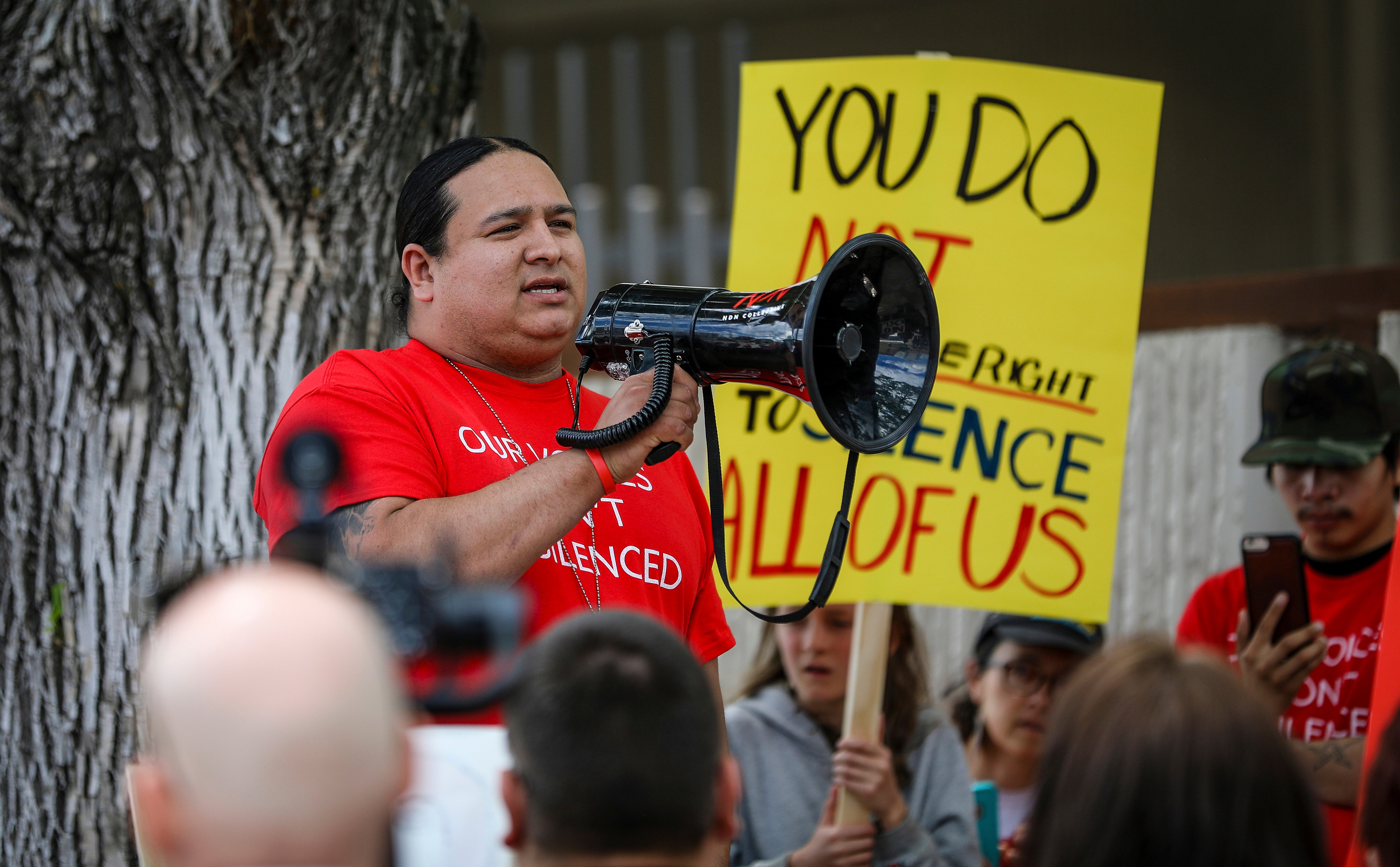Lakota activist: Mount Rushmore key in move to regain land
When then-President Donald Trump visited Mount Rushmore last year for a fireworks display, Lakota activist Nick Tilsen saw an opportunity to advance the Land Back Movement

Your support helps us to tell the story
From reproductive rights to climate change to Big Tech, The Independent is on the ground when the story is developing. Whether it's investigating the financials of Elon Musk's pro-Trump PAC or producing our latest documentary, 'The A Word', which shines a light on the American women fighting for reproductive rights, we know how important it is to parse out the facts from the messaging.
At such a critical moment in US history, we need reporters on the ground. Your donation allows us to keep sending journalists to speak to both sides of the story.
The Independent is trusted by Americans across the entire political spectrum. And unlike many other quality news outlets, we choose not to lock Americans out of our reporting and analysis with paywalls. We believe quality journalism should be available to everyone, paid for by those who can afford it.
Your support makes all the difference.When then-President Donald Trump visited Mount Rushmore last year for a fireworks display, Lakota activist Nick Tilsen saw an opportunity to further a goal of returning to Native American tribes control of land they once held.
It would land him in jail, facing felony charges after he organized a demonstration to block a road leading to the monument, but it also made Mount Rushmore a focal point for that effort, known as the Land Back Movement.
Now Tilsen, who heads a Rapid City, South Dakota-based Indigenous advocacy organization called NDN Collective, has a plan to make dramatic changes at Mount Rushmore by turning it over to tribal control. But that plan puts him in direct conflict with top Republicans in the state like Gov. Kristi Noem who say it should be preserved as a celebration of America, complete with an annual Independence Day fireworks display.
While Noem got her wishes last year when fireworks returned to the monument after a decade-long hiatus, Trump's visit also allowed Tilsen to bring attention to the symbolic importance of the monument, where 60-foot (18-meter) stone carvings of former Presidents George Washington, Thomas Jefferson, Theodore Roosevelt and Abraham Lincoln tower over the Black Hills — land that was seized illegally from Lakota tribes.
“What Mount Rushmore has always represented is a system of power and oppression and white supremacy, because they take a sacred place and carved the faces of white men who are responsible for our colonization and our demise,” Tilsen said.
Noem, a close ally of Trump and potential 2024 presidential contender, has cast protecting the monument as part of a larger cultural battle over how history is told.
“Those four men are etched into Mount Rushmore are incredibly important to our history,” she told Fox News this month. “We saw a movement to tear them down earlier this year. They needed to be protected.”
Noem deployed the South Dakota National Guard for the July 3 event. Guard members advanced on the demonstration, leading to physical confrontations with protesters. Some were arrested, and Tilsen was charged with felonies and misdemeanors that carried a maximum punishment of nearly 17 years in prison.
Although Noem signed an agreement for another fireworks display this year, the National Parks Service has said it won’t allow it, citing safety concerns and tribes’ objections.
Tilsen recently reached an agreement with prosecutors that the charges would be dropped if he completes a prison diversion program. Though prosecutors say that part of the program is admitting wrongdoing and ensuring that offenses don't happen again, Tilsen told the Associated Press he is not done pressing for changes to the monument and the Black Hills.
“For Indigenous people, racial equity means returning Indigenous lands back into Indigenous hands,” he said.
For the Lakota, the Black Hills are known as Paha Sapa — “the heart of everything that is” — and for Tilsen, they are central to racial justice.
But the monument is also closely tied to the state's identity. Its official nickname is “the Mount Rushmore state," and its license plates feature the stone carvings.
After one commentator called the monument a “stone idol to presidential colonizers” last month, the governor took to Twitter, writing, “The left wants to re-write our history by attacking the leaders who made America the most special country ever. It’s our duty to teach our kids the truth.”
But Tilsen said he wants to use the monument as a way to teach truth — in a way that uncovers the country's flawed history. He wants Mount Rushmore closed, then reopened under tribal control and with a new name — the Six Grandfathers Tribal Park, for the Lakota name of the rock formation where the monument is carved.
“What ends up happening at Mount Rushmore, we actually tell the true history of this land,” he said. “We tell the history of the treaties, we tell the history of these men that are on the mountain and what their policies were like,” adding that could spark conversations about how the history is connected to current issues among Native American communities, including high rates of poverty and incarceration.
Is Tilsen's vision to reimagine the monument realistic? It's not clear. But he says that between a nationwide racial reckoning and the recent appointment of the country's first Native American secretary of the interior, Deb Haaland, there is an opportunity to turn over stewardship of public lands to tribes.
“I think that we have some champions in the highest places in the government who are wanting to fight, make this happen,” he said. “And movements like ours contributing to the political landscape being very different than it was on July 3rd.”